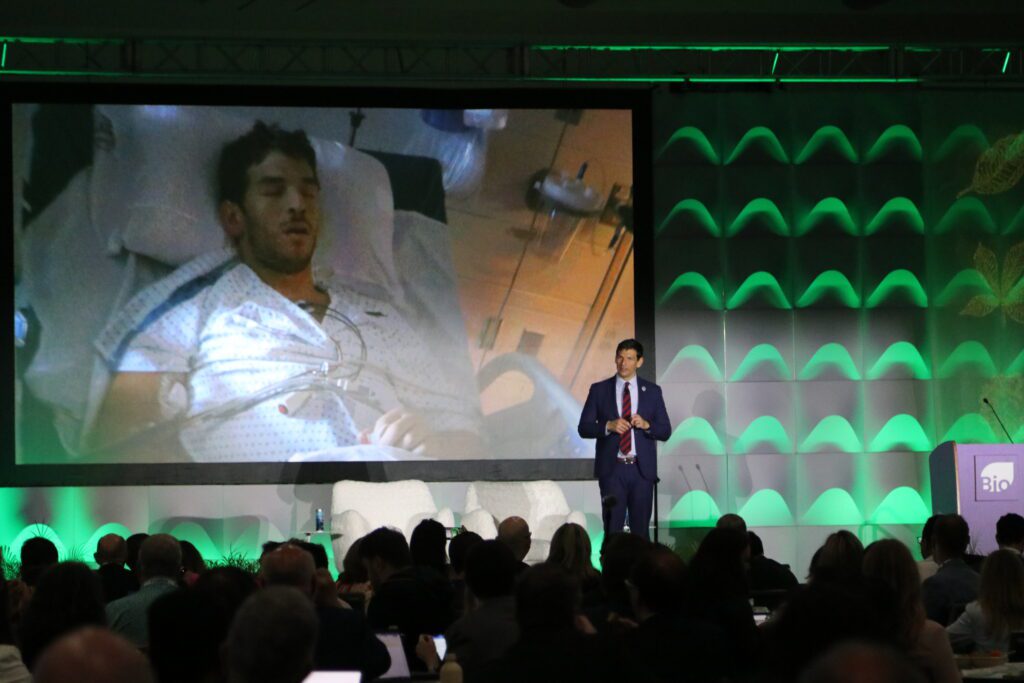In the season opener of the I am BIO Podcast, Dr. David Fajgenbaum shares his journey from patient to scientist, explaining how his battle with a life-threatening disease led him to make groundbreaking discoveries that are now helping others with rare diseases.
Dr. Fajgenbaum’s story begins in medical school, when he was diagnosed with Idiopathic Multicentric Castleman Disease (IMCD), a rare disorder that nearly claimed his life five times.
“I went from taking an exam for OBGYN to then going down the hall in the hospital that I was working at and going to the emergency department,” he recalls. “They ran some blood tests, and my doctor came into the room and said, ‘David, your liver, your kidneys, your bone marrow, your heart, and your lungs are all shutting down. We have to hospitalize you right away.’”
Despite this dire prognosis, Dr. Fajgenbaum was determined to survive and fight back. His personal experiences drove him to collect blood samples and conduct research on his own body.
Fighting back with research
After years of being hospitalized repeatedly, Dr. Fajgenbaum’s experiments revealed that a key communication line in his immune system, called mTOR, was in overdrive.
“I thought to myself, ‘Well, what if I could turn off that alarm system or communication line in my body?’”
Dr. Fajgenbaum began investigating existing medications that could potentially treat his condition. He settled on sirolimus, a drug traditionally used for preventing organ transplant rejection. This drug put him into remission for over 10 years.
“This July 5th marked 10 and a half years that I’ve been in remission on this drug after nearly dying five times in the three years before starting it,” he shares.
Existing medicines, new uses

The success of this repurposed drug led Dr. Fajgenbaum to found Every Cure, a non-profit organization focused on discovering new uses for existing medications. The organization’s mission is to speed up the process of finding treatments for the thousands of diseases that currently have no approved therapies.
This is where artificial intelligence (AI) plays a role.
“We apply five different AI algorithms to these biomedical knowledge graphs, and it gives us a score from zero to one for every drug versus every disease,” explains Dr. Fajgenbaum. “All 3,000 drugs against all 20,000 diseases, meaning that within one day we can calculate 60 million scores from zero to one to tell us whether the drug likely works for that disease or not.”
Instead of relying on slow, manual processes, AI allows researchers to identify promising drug candidates for diseases quickly.
“It would take many, many, many years for labs like mine to unlock even a fraction of all the diseases that are waiting for therapies,” he says.
Dr. Fajgenbaum’s work isn’t theoretical. He shares a story about a patient named Joseph, who was suffering from Poem Syndrome. Joseph’s condition was so severe that he was about to be transferred to hospice care. Thanks to Every Cure’s algorithms, which identified potential treatments based on similarities between Poem Syndrome and another disease, Joseph’s doctors were able to prescribe a combination of drugs that saved his life.
“A couple days went by, and we got the phone call from Tara to say that they worked, and that not only was he out of the ICU, but he was in the hospital, and they were talking about discharging from the hospital in just a couple weeks later.”
While most drug companies focus on developing new drugs for specific diseases, Every Cure’s mission is broader. “Every Cure is the largest drug company in the world because literally every drug that’s ever been made by any drug company and is approved is in our pipeline. All 3,000 of them,” Dr. Fajgenbaum quips, though noting they don’t own any of the drugs they are working with.
To learn more about Dr. Fajgenbaum’s journey and the revolutionary work being done at Every Cure, listen to the full episode of the I am BIO Podcast at bio.org/podcast and visit everycure.org.



